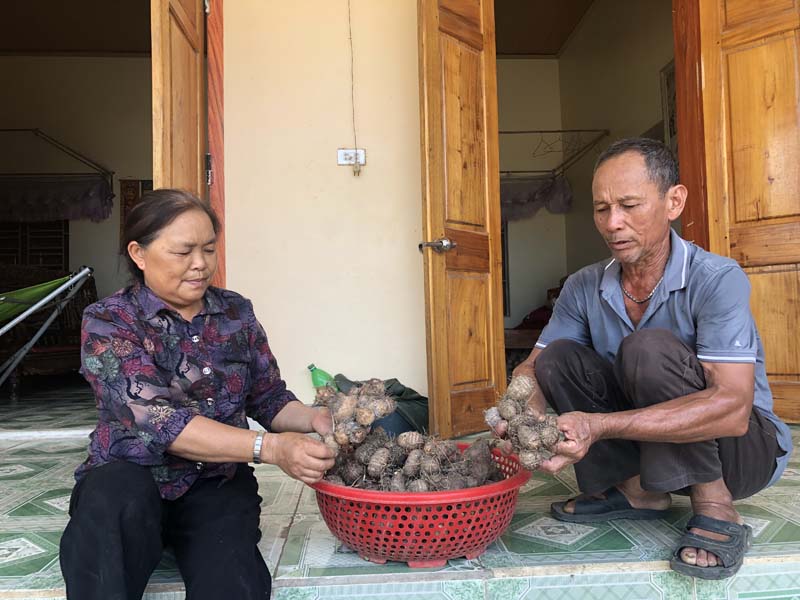
(HBO) - Taros made by Yen Tri agricultural cooperative in Yen Tri commune have been selected by Yen Thuy district to join the provincial-level One Commune, One Product (OCOP) programme in 2020.
 Members of Yen Tri agricultural cooperative (Yen Thuy)
prepare quality taro seedlings.
Members of Yen Tri agricultural cooperative (Yen Thuy)
prepare quality taro seedlings.
Yen Tri taro has a good and delicious taste, wining consumers’ favour. Taro growing brings high
profits to farmers. The communal Party committee and authorities encouraged
local residents to expand farming areas meeting OCOP standards to improve product value and create a stable
consumption market.
Yen Tri commune is home to about 20 ha of taros grown in all hamlets, mostly in Ao Hay with seven ha. Bui Xuan Bac from Ao Hay hamlet, a member of Yen Tri agricultural cooperative said his family plants around 3,000 sq.m of taros this year, yielding more than four tonnes. Taro is drought-resistant,
easy to grow with few pests.
With the use of decomposed manure, taro plants grow
well with a lot of tubers. Thanks to mastering cultivation techniques, taros
enjoy bumper harvest almost every year. Selling prices are stable, ranging from
15,000 – 17,000 VND per kg. Income from taro cultivation is 4-5 times higher
than rice. This year, the cooperative’s taro products register to join the OCOP
programme. "As quality is a crucial factor, we are aware of improving it,” Bac said.
In order to help the
cooperative join the programme, the communal Party Committee and authorities partnered with the cooperative to raise its
members and farming households’ awareness of expanding taro area, farming
techniques and set of criteria for OCOP grading.
The cooperative
registered for origin traceability and is completing dossier and packaging. It
also partnered with taro farming households to expand cultivation areas and
ensure the supply of materials. For the next crop, the commune plans to grow
nearly 7ha of taros meeting VietGAP standards. If meeting OCOP standards, its
value will be raised, contributing to ensuring the sustainable development of
local agriculture sector and improving farmers’ lives./.
In Hoa Binh province, 11 traditional craft villages with more than 400 small-scaled production households have put in place a clean and green production model, establishing new standards for sustainable development. Waste collection sites and wastewater treatment facilities have been meticulously managed by local residents.
To make it easier for the residents to handle administrative procedures, Yen Bong Commune (Lac Thuy District) has identified the administrative reform as one of its key tasks. By implementing a range of synchronized solutions, the commune has seen the positive changes in the administrative reform, meeting the needs of its people.
Mai Chau district has firmly established itself as a standout destination on Vietnam’s tourism map, attracting both domestic and international visitors with its breathtaking landscapes, rich ethnic culture, and warm hospitality. However, beyond its natural and cultural charm, a secure and well-managed tourism environment has added to Mai Chau’s appeal.
As Vietnam enters a new phase of economic and administrative reform in 2025, Hoa Binh province is stepping up its efforts to streamline governance, boost economic growth, and attract investment.
The Hoa Binh provincial People's Committee held its monthly meeting on March 26 to review the progress of key projects, assess budget revenue and public investment disbursement, provide feedback on draft documents for submission to the provincial Party Committee's Standing Board, and discuss other important matters related to the committee's governance activities.
Playing a key role in Hoa Binh province’s economic development, Luong Son district has been focusing on science and technology development, innovation, and digital transformation.



 Members of Yen Tri agricultural cooperative (Yen Thuy)
prepare quality taro seedlings.
Members of Yen Tri agricultural cooperative (Yen Thuy)
prepare quality taro seedlings.